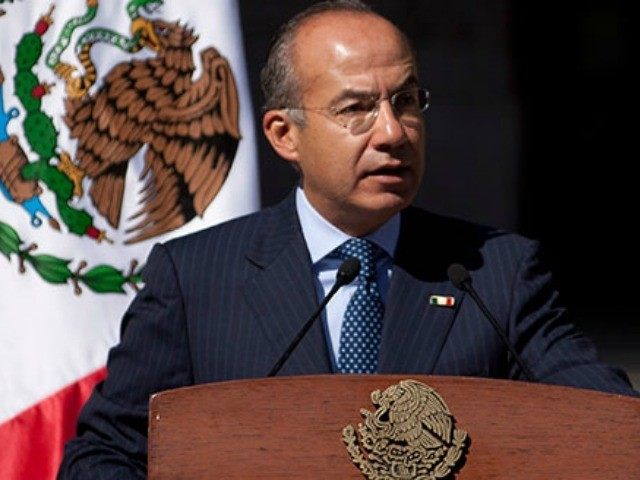Former president of Mexico, Felipe Calderon, offered his own reason why strengthening the border to stanch the flow of illegal immigrants from Mexico is wrong: illegal immigrants will stay in the U.S. rather than return home to Mexico, because they fear they won’t be able to return to the U.S.
He also stated that most illegal immigrants don’t want to be American citizens.
Speaking to the International Business Times from Davos, Swizerland, at the World Economic Forum, where he serves as Chair of the Global Commission on Economy and Climate, Calderon stated, “Many of them are currently trapped. There are a lot of these people [who] want to be in Mexico eight months every year, but they are unable to go there, because if they cross the border, they will never be able to cross back again.”
Calderon, the Mexican president from 2006 to 2012, added that many illegal immigrants only want to make enough cash so they can return to Mexico and build homes there. He suggested that the U.S. should allow “temporary work in a massive way,” but eschew offering illegal immigrants citizenship automatically. He continued, “I don’t believe that most of the Mexican workers looking for a job in the United States are wanting to be American citizens. They are looking for an opportunity to get economic benefits and actually thinking when they are leaving [Mexico] what will be the way in which they can go back to their own home.”
Calderon lectured anti-immigration groups that they were missing the boat, saying:
The American society, even the more conservative people, are getting exactly the contrary results that they were looking for. In other words, anti-immigration laws are provoking millions of people living in the States that are unable to go back to their own countries. And they start to think, “Well if I need to stay here, it is better to do that all the way.”
Calderon pointed out that the threat of ISIS, other terrorist groups, and organized crime had spurred a new focus on border control around the world. He lamented that organized crime, such as the drug cartels in Mexico, has opportunities to succeed far better in developing countries:
In developed countries, especially with huge traditions with judges, criminal law and a culture … with [a] law-enforcement tradition, it is more difficult for them to take over. But the big difference between developed and developing countries is that the organized crime in [developing] countries is able to take over the government. It is able to take over the police groups.
This week, the House will vote on the Secure Our Borders First Act, brought before the House by Homeland Security Committee Chairman Michael McCaul (R-TX). The bill would require the Department of Homeland Security to intercept all unlawful border crossings, permit Border Patrol agents to scour national parks or land under environmental protection for illegal immigrants, and surveillance drones to operate in efforts to control the border.
Calderon didn’t do much to help the problem in his tenure as president; as Reason magazine reported in 2011, Howard Campbell, an expert on drug cartels, said:
President (Felipe) Calderon’s war on drug cartels has been such an abysmal failure that entire regions of Mexico are effectively controlled by non-state actors, i.e., multipurpose criminal organizations…
These criminal groups have morphed from being strictly drug cartels into a kind of alternative society and economy. They are the dominant forces of coercion, tax the population, steal from or control utilities such as gasoline, sell their own products and are the ultimate decision-makers in the territories they control.
Commenting on the notorious Zeta paramilitary cartel that ruled parts of Mexico, Reason continued, “As the Zetas impose taxes, they also produce tax exiles.”

COMMENTS
Please let us know if you're having issues with commenting.